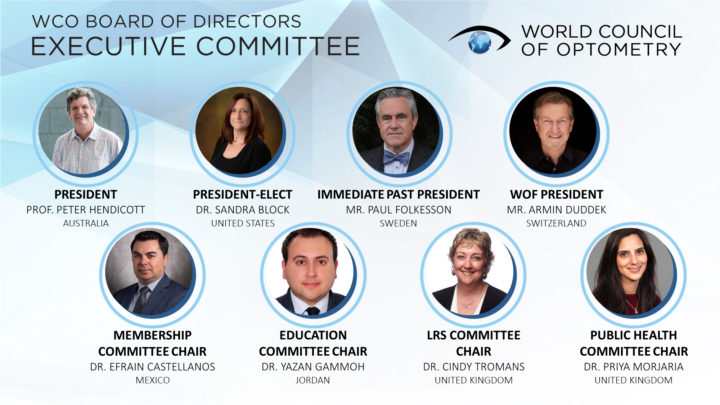WCO is proud to announce the new Executive Committee for the 2021-2023 term.
Read the full inaugural address from WCO President, Prof. Peter Hendicott, and statement from WCO President-Elect, Dr. Sandra Block.
WCO welcomes Prof. Peter Hendicott as the new WCO President and Dr. Sandra Block as the WCO President-Elect. Additionally, we welcome Dr. Efrain Castellanos as Membership Committee Chair, Dr. Yazan Gammoh as Education Committee Chair, and Dr. Priya Morjaria as Public Health Committee Chair. Mr. Paul Folkesson will now step into the role of Immediate Past President. Mr. Armin Duddek and Dr. Cindy Tromans will continue to serve as WOF President and LRS Committee Chair, respectively.
Below is WCO President Prof. Peter Hendicott’s inaugural address to the General Assembly on 18 November 2021.
Optometry is now in a time of both challenge and opportunity. The WHO World Report on Vision, the World Health Assembly and UN resolutions together set out the scale of the challenge facing eye care, the impact of vision impairment on achievement of Sustainable Development Goals, and the inclusion of refractive error correction within Universal Health care. One of the consequences is that governments will need to be reporting on their progress in meeting the international goal to reduce visual impairment due to uncorrected refractive error. It is up to optometry as a profession as to how it responds to both the challenge and opportunity now presented.
These reports highlight the impact of worldwide population growth and ageing. In parallel with this overall population growth, there will be an increase in the percentage of the population over 60 years of age, and also an increase in life expectancy at birth over the same time period.
Population change will increase the need for vision and eyecare. The rise in myopia prevalence globally is but one facet of this. The increasing ageing population will increase the absolute number of people with chronic disease that accompanies ageing, as well as increasing the impact of uncorrected presbyopia. The challenge and opportunity for optometry though extends beyond refractive care aimed at reducing avoidable vision impairment and blindness. Conditions causing vision impairment such as glaucoma, diabetic retinopathy, age-related maculopathy and cataract are other parts of this equation. Other eye care needs such as rehabilitative vision care, dry eye, blepharitis, conjunctivitis all lead to the need for eyecare services. Optometry is challenged to help meet these increasing eyecare needs.
We know currently over 1 billion people worldwide experience vision loss primarily because they have no access to vision care. More than 90% of these people live in low to middle income countries; nearly 75% are over 50 years of age, and 55% are women. Unaddressed poor vision is estimated to have a global productivity loss of US $411 billion annually. Sobering figures, even more so when we know that 90% of vision loss is preventable through early detection and treatment.
We need to remember that for many people significant inequities exist in their ability to access vision care. The burden of preventable vision loss is greater in areas of social and economic disadvantage, in rural areas, for older people, ethnic minorities, indigenous peoples, and women. These inequities are not solely developing world issues. They exist in countries where both health systems and optometry are well developed and established.
Additionally, in many regions, eyecare is delivered predominantly in secondary and tertiary healthcare settings which can restrict access. The WHO is proposing integrated people-centered eyecare (IPCEC) as an approach to health care services which are managed and delivered so that people receive a continuum of health interventions covering promotion, prevention, treatment and rehabilitation; which address a full spectrum of eye conditions according to individuals’ needs; which are coordinated across different levels and sites of care within and beyond the health sector; and which recognize people as participants and beneficiaries of these services, throughout their life course. An emphasis is on health service delivery within communities, which is the strength of optometry.
Optometry needs to position itself to speak and act towards the achievement of improved healthcare outcomes for society in terms of eyecare, and to also recognize the impact of improved eyecare on social, financial and educational outcomes as well. Optometry will need to ensure that it has the relevant competencies in ocular disease, clinical and management skills, team work, leadership and advocacy that will enable the profession to participate fully in healthcare systems to deliver enhanced health outcomes both at a country level, and an international level, aligning with and participating in this international eye health agenda. We need to recognize that solutions to the issues facing eye care will not necessarily be attained by simply training more practitioners.
In many countries, optometry is well prepared for a role in this space and is ready to contribute to both the management of the increasing burden of refractive error and disease, and to the public health agenda so that optometry both recognizes and contributes to the wider public and social needs of health care in terms of health care teams, prevention, detection, and management. In other countries, a wider role for optometry in improving healthcare outcomes will require legislative change to reflect the scope of optometric education; in others, expansion of optometric education to equip future optometrists with the necessary increased skills will be required. It is up to us as a profession in each country to recognize and react to the challenges and opportunities to improve outcomes in eye care and eye health, and the impact improving eye health will have on society.
The goal over the next two years is to enhance the foundation of our profession’s response to these challenges and opportunities, through:
- identifying and acknowledging gaps in our skills, knowledge and competencies where they exist
- working toward closing these gaps through education, both at entry level to the profession and for existing optometrists
- advocacy for legislation of who can practice optometry to improve public safety, and for scope of practice to be commensurate with the level of education
- entering robust discussion across our countries and regions about future alternative models of the provision of eye care by optometrists, to improve efficiency, access and outcomes, considering the inclusion of eye care delivery by other practitioners, with optometry taking a leading role in partnership to develop models of delivery, training, leadership and management of eye care teams
- consider the impact of current and future technology on the delivery of eye care, and how these tools can be utilized by optometry to improve equity, access and outcomes. Increasingly these are lower cost, portable, app based, AI systems for detection, diagnosis and monitoring.
I look forward to working with you all towards a strong future profession.
In her acceptance speech, Dr. Sandra Block stated:
I see WCO as the conduit for sharing information from the countries to the global platform and the global platform to the country members. Communication is a two way street and WCO needs to listen and address the needs from both sides. I see the next few years as sentinel to optometry developing a foothold in addressing many aspects of eye care. WCO has programs that are focused on developing advocacy, leadership and succession planning– we need to strengthen these programs. We have two tool kits that are ready to launch as resources to strengthen our position. We need to expand these types of resources so that the countries can use them to expand human resources, improve optometric education, be a part of the better surveillance of VI and blindness. Our goal should be to help build optometry as a primary eye care provider within the health team. We have the ability to grow and serve and I look forward to being a part of the process. Thank you for your support and I look forward to working together to make optometry stronger.
Click here to view the complete list of WCO’s 2021-2023 Board of Directors.
Congratulations to all! WCO looks forward to a successful new term!


